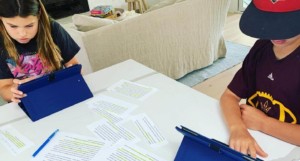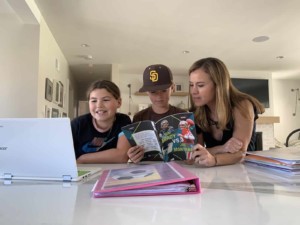Cybersecurity: A Promising Approach to Integrating CompSci and PBL

We all know how important computer science skills (or at least the ability to think computationally) will be for students in the future. But computer science skills in and of themselves won’t guarantee success–students will also need the uniquely human skills (think creativity and empathy) that will be required in the workforce of tomorrow. We should be looking for ways to bring computer science into authentic PBL, but that is an undeniably tall order.
One way is through data science. Another, it turns out, is through cybersecurity.
I recently had the chance to chat with Helen McConaghy, Technology Integration Specialist of The Wellington School (a K-12 school in Columbus, Ohio), who has spent this year building out a new extracurricular program focused on cybersecurity for her students, and has seen promising early results.

The bulk of the club is focused on working on the CyberPatriots Competition. It’s their first year taking part in the competition, after McConaghy heard about it at a conference last year. The club lines up with Wellington’s focus on providing ”deep dive” personal interest classes, though it is, for now, an afterschool club that has been going on since the beginning of the school year. McConaghy is proud that her team (composed of three 5th graders, one 6th grader and one 7th grader) has made it to the semifinals this year, which is one step from nationals in Washington, D.C.
The Competition is composed of multiple rounds separated by periods of a few weeks, and each round lasts 6 hours. Teams are sent an image that includes computer vulnerabilities (for interfaces such as Windows 7/10, servers or Ubuntu OS), and students are given admin rights to secure the machine (the contest is designed in a way as to allow students to practice skills without damaging a machine, with features such as audio cues to know if they’ve fixed or not fixed the issue–there is even a component of live scoring).
“One of the really cool things is the group of cyber training sessions provided by CyberPatriots,” says McConaghy. “Kids trade bugs and try to determine mistakes, and there are even some online simulations of cybersecurity jobs.”

McConaghy attributes her team’s success to some of the deeper cultural foundations that are prioritized at Wellington. “Resilience and growth mindset are both priorities, along with persevering through challenges and setbacks,” she says. “When something happens and they lose points, they don’t panic–they support each other, and go back and fix the mistake. They don’t fear mistakes.” (We here at Getting Smart really value this sort of culture as a component of design thinking–check out our recent discussion between Adam Kulaas and Emily Liebtag on how beneficial it can be).
I was surprised to hear that she’s already seen some positive outcomes for her students in spite of the early stages of the work. She says the top five changes she has noticed are:
- An ability to handle deadlines and pressure. At one point, for example, a computer wasn’t working that they needed to use, so she worked with a 5th grader to take RAM out of nearby machines to put together a new machine, then download software and get the project up and running.
- The development of students’ collaboration skills. As students work together and rely on one another to complete the challenges, they develop important real-world skills.
- New research skills, including how to discover and vet resources online.
- Project management–the project makes them practice developing to-do lists of things they’ll need and keep updated notebooks to track changes (including documenting their code so their whole team stays in the loop, an important aspect of most real-world coding professions).
- More confidence in exploring and working in the “cyberworld.”
Wellington’s robotics club has grown from 6 or 7 students to 30+ over the last few years, and McConaghy expects similar growth for the cybersecurity club. “Students get really into it because it’s more realistic than just some random coding project like game development.”

Toward the end of our conversation, I had a hard question for McConaghy. It’s well-known that the same skills that can make you a cybersecurity expert could equally well make you a cyber crime expert. How was she working to make sure her students didn’t go down the wrong path with their new skills?
“It’s all about instilling the right beliefs,” she said. “At the Wellington School, we place high value on character and service, and we have an advisory program focused on helping students develop a balanced life. Our middle school motto is ‘using your powers for good,’ and the first lesson of the CyberPatriots competition is actually a lesson on morality, which requires an agreement from all participants to use their powers for good… We encourage our students to ‘think and act as leaders.’” Their advisory program is guided by Martin Seligman’s “PERMA” theory, and focuses on students’ positive emotion, accomplishment, engagement, positive relationships and “help.”
“I think cybersecurity is important,” said McConaghy. “And it’s really important in this world to take kids beyond what they’re learning in class–a competition or creating something for someone else.“ With Wellington’s focus on foundational culture, advisory, and student interest, it’s not hard to believe that they are succeeding at this difficult (though fundamental) component of high quality PBL.
For more, see:
- How Can We Bring Coding into Authentic PBL?
- The Keys to High Quality PBL: Public Products and Presentations of Work
- Skip Coding, Teach Data Science
Stay in-the-know with all things EdTech and innovations in learning by signing up to receive the weekly Smart Update.








Allen Atkins
I think cybersecurity is important,